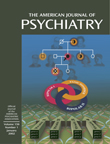Elevation of Prolactin Levels by Atypical Antipsychotics
Abstract
OBJECTIVE: Atypical antipsychotics are thought not to elevate prolactin levels. The authors examined data suggesting that atypical antipsychotics do elevate prolactin levels but more transiently than typical antipsychotics. METHOD: Prolactin levels in 18 male patients with schizophrenia who were receiving atypical antipsychotics were monitored over the 24-hour period following administration of their daily oral dose of risperidone, olanzapine, or clozapine. RESULTS: The baseline prolactin levels in patients receiving risperidone (mean=27 ng/ml, SD=14) were abnormally high, but baseline prolactin levels in patients receiving olanzapine (mean=9 ng/ml, SD=5) and clozapine (mean=9 ng/ml, SD=5) were not high. All three atypical antipsychotics caused a doubling of prolactin levels over baseline levels 6 hours after medication administration. CONCLUSIONS: These data suggest that these atypical antipsychotics raise prolactin levels, although the increases with olanzapine did not reach statistical significance. This suggests that the differences in the effects on prolactin levels of atypical and typical antipsychotics are not categorical but lie in the degree and duration of dose-induced prolactin elevation, attributable to the differential binding properties of each drug on pituitary dopamine D2 receptors.



